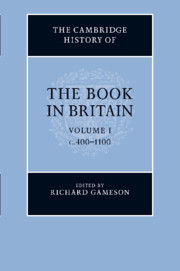Book contents
- Frontmatter
- 1 From Vindolanda to Domesday: the book in Britain from the Romans to the Normans
- PART I THE MAKING OF BOOKS
- PART II THE CIRCULATION OF BOOKS
- PART III TYPES OF BOOKS AND THEIR USES
- 15 The book in Roman Britain
- 16 The use of the book in Wales, c. 400–1100
- 17 The biblical manuscripts of Anglo-Saxon England
- 18 Anglo-Saxon gospel-books, c. 900–1066
- 19 Liturgical books
- 20 Anglo-Saxon prayerbooks
- 21 Psalters
- 22 Music books
- 23 Anglo-Saxon schoolbooks
- 24 Law books
- 25 Manuscripts of the Anglo-Saxon Chronicle
- 26 Old English homiliaries and poetic manuscripts
- PART IV COLLECTIONS OF BOOKS
- PART V CODA
- Bibliography
- Concordance of named manuscripts
- Index of manuscripts
- General Index
- Plate 4.1: The Lindisfarne Gospels"
- Plate 5.1: The Lichfield/St Chad Gospels"
24 - Law books
from PART III - TYPES OF BOOKS AND THEIR USES
Published online by Cambridge University Press: 28 March 2012
- Frontmatter
- 1 From Vindolanda to Domesday: the book in Britain from the Romans to the Normans
- PART I THE MAKING OF BOOKS
- PART II THE CIRCULATION OF BOOKS
- PART III TYPES OF BOOKS AND THEIR USES
- 15 The book in Roman Britain
- 16 The use of the book in Wales, c. 400–1100
- 17 The biblical manuscripts of Anglo-Saxon England
- 18 Anglo-Saxon gospel-books, c. 900–1066
- 19 Liturgical books
- 20 Anglo-Saxon prayerbooks
- 21 Psalters
- 22 Music books
- 23 Anglo-Saxon schoolbooks
- 24 Law books
- 25 Manuscripts of the Anglo-Saxon Chronicle
- 26 Old English homiliaries and poetic manuscripts
- PART IV COLLECTIONS OF BOOKS
- PART V CODA
- Bibliography
- Concordance of named manuscripts
- Index of manuscripts
- General Index
- Plate 4.1: The Lindisfarne Gospels"
- Plate 5.1: The Lichfield/St Chad Gospels"
Summary
There is, properly speaking, no such thing as an Anglo-Saxon law book. There are books, imported and home-grown, of ecclesiastical (‘canon’) law. Several important collections of secular legislation from before 1066 were assembled in the post-Conquest period. But the only volumes written in pre-Conquest England which contain the laws of lay society are devoted for the most part to non-legal texts. All the same, it would be precipitate to draw conclusions about what once circulated from what now survives. A useful comparison may be drawn with ‘charters’. These title deeds were originally written on single pieces of parchment. Though more than 100 survive, single sheets are scarce in all but a few archives, because they were copied into comprehensive cartularies. There was even less reason to keep individual copies of codes once they were assumed into collections like those of the twelfth century. We can no more conclude that laws were available only in such forms than that charters were kept only in cartularies. For that very reason, an account of pre-Conquest law books should begin by asking what can be learned about the law books of the Old English period from those that were made after it came to an end.
In the first place, we may consider the very latest pre-modern copy of a legal text in Old English to survive (no. 15 in the appendix at the end of the chapter). The first thing to note about it is that it is the second part of a composite manuscript, the first being the utterly different no. 4. This is one example, nos. 7 and 11 being another, of the way that this exercise is complicated by the determination of early modern antiquarians to convert our material into what suited their bibliographical purposes. That aside, 15 is in a class of its own, because it alone of the entire series is the sort of book that one can easily imagine being carried round by judicial officials.
Keywords
- Type
- Chapter
- Information
- The Cambridge History of the Book in Britain , pp. 525 - 536Publisher: Cambridge University PressPrint publication year: 2011
- 3
- Cited by



